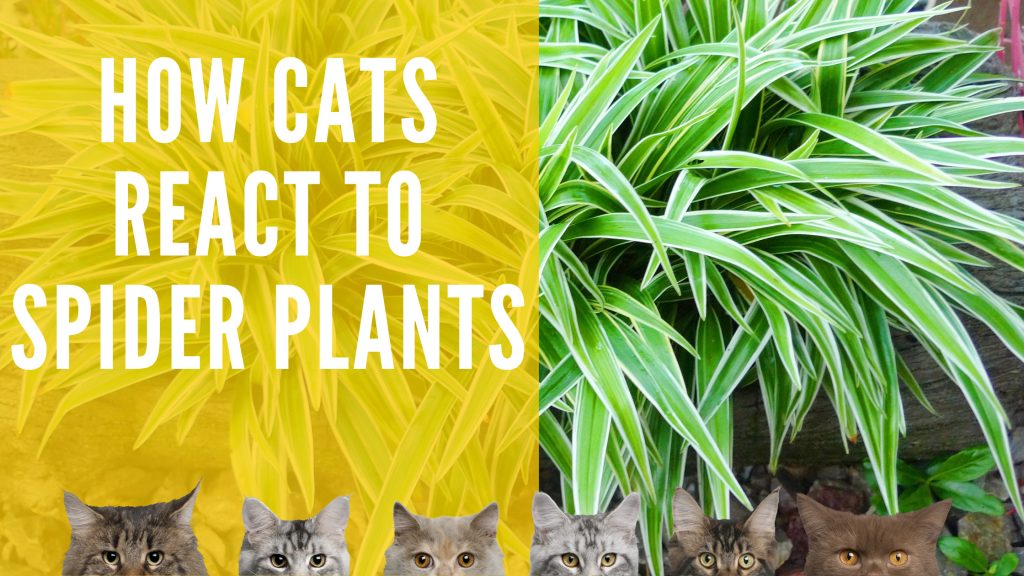Own a cat?
You might be curious about what happens if they eat your spider plants. Your next question would then be, “are spider plants toxic to cats?” Spider plants (Chlorophytum comosum) are common houseplants that grow in warm climates worldwide and are not considered poisonous.
However, some cats may find them displeasing because they contain starches and fibers that can irritate their stomach.
If your cat doesn’t typically eat plants, it’s best to leave them alone – but if they do happen to shred one accidentally, there is no harm done.
Just be sure to remove the plant globes or shredded pieces, so your cat doesn’t build up an edible residue over time!
If you come home to find your cat munching on a spider plant, you need not worry too much about its health. Spider plants are not considered to be poisonous to our furry friends.
Table of Contents
What Are Spider Plants?
Spider plants are flowering plants native to tropical and subtropical regions. The plant gets its name from the shape of its flowers, which resemble tiny spiders.
Because they are adaptable and require little upkeep, spider plants are common indoor plants.
Spider plants are typically grown in pots or containers and can be placed indoors or outdoors. The plant prefers warm, humid conditions and will thrive in bright, indirect sunlight. Water the spider plant regularly, allowing the soil to dry out slightly between waterings.
Spider plants are relatively low-maintenance and only need to be fertilized once every two months.
If you’re looking for a beautiful, easy-to-care-for plant, then a spider plant is a great option! These versatile plants can tolerate various growing conditions and make a beautiful addition to any home or garden.
What Is The History Of Spider Plants?
Spider plants are native to Africa and were first introduced to Europe in the early 1800s. Initially grown as ornamental plants, they eventually became popular houseplants due to their ability to thrive in indoor environments.
Because they require little maintenance and are simple to look after, spider plants are perfect for those who don’t have a lot of free time or gardening experience.
The name “spider plant” comes from the plant’s long, slender leaves that resemble spider legs. Ordinarily green, the leaves can also be speckled with white or yellow stripes.
Spider plants produce small white flowers that give way to baby spider plants, which can be replanted to create new spider plant colonies.
Spider plants purify indoor air quality by absorbing harmful toxins such as carbon monoxide and formaldehyde. They are also effective at filtering out bacteria and other pollutants.
For these reasons, spider plants are often used in offices and other commercial spaces.
How Do Cats React To Spider Plants?
Despite not being toxic to cats, spider plants can upset your stomach if you eat a lot of them. Cats may be attracted to the spider plant because its long, green leaves resemble grass.
If your cat nibbles on a spider plant, he may experience vomiting or diarrhea.

To prevent your cat from getting sick, keep spider plants out of reach or consider growing a different type of plant.
What Indicates Cat Toxicity and How Do Cats Show It?
Cats are capable of displaying a wide range of toxic symptoms, each of which is specific to the substance to which the cat has been exposed and can only be caused by that substance.
If you have any reason to believe that your cat has been poisoned, the first thing you should do is take it to a qualified veterinarian as soon as you can.
Cats that have consumed poisonous substances may exhibit symptoms of illness, including nausea, vomiting, diarrhea, drooling, loss of appetite, weakness, seizures, and collapse.
If you notice any of the symptoms discussed above being exhibited by your cat, it is imperative that you schedule an appointment with a qualified veterinarian as soon as you can.
How Can You Treat A Cat Who Has Ingested A Spider Plant?
Contact your veterinarian immediately if you suspect your cat has ingested spider plant material. Eating a spider plant can be toxic to cats and cause vomiting, diarrhea, and difficulty breathing.
If you have the spider plant in your home, remove it from your cat’s reach. If you suspect your cat has eaten part of the plant, watch for any signs of illness and contact your veterinarian immediately.
Your veterinarian may recommend giving your cat activated charcoal to help absorb the toxins from the spider plant. They may also recommend IV fluids to help prevent dehydration.
In severe cases, hospitalization may be necessary.
Are There Any Nontoxic Alternatives To Spider Plants For Cats?
There are many cat-safe alternatives to spider plants, and some good choices include catnip, wheatgrass, and oat grass. All the nutrients a cat needs can be found in these plants, and they pose no danger to their health.
Cats go crazy for catnip, a plant in the mint family. It contains nepetalactone, which is a substance that attracts and stimulates cats. Catnip is known to have a calming effect on cats, so it’s a great choice if your cat is anxious or stressed.
Wheatgrass is another great option for cats. There are lots of vitamins and nutrients in it that are good for your cat. Wheatgrass is also known to boost the immune system and help with digestion.
Oat grass is another safe plant for cats. It contains fiber, which can help with digestion, and chlorophyll, which can help detoxify the body. Oat grass is also a natural deodorizer, so it’s perfect if you have a smelly kitty!
Conclusion
A common question from cat owners includes asking are spider plants toxic to cats when eaten. Spider plants do not present a direct danger to cats; however, they can cause toxic effects such as nausea and vomiting if they come into contact with them.
If you find out that your cat has eaten a spider plant, it is imperative that you seek immediate medical attention at a veterinary facility.
This is because it is extremely important that your cat receives prompt treatment.
Before bringing any new plants into your home, it is important to do some research first because there are many types of plants that are not harmful to cats.
Recent Posts
Have you found yourself wondering, 'why is my bamboo growing so slow?' Despite the fact that bamboo plants are remarkably fast-growing, it can sometimes take months (or even years!) to see any signs...
Miracle-Gro is a huge help when you are trying to get decent yields out of your plants or if you want them to thrive. However, you may have noticed that a single dose of fertilizer does little to...
